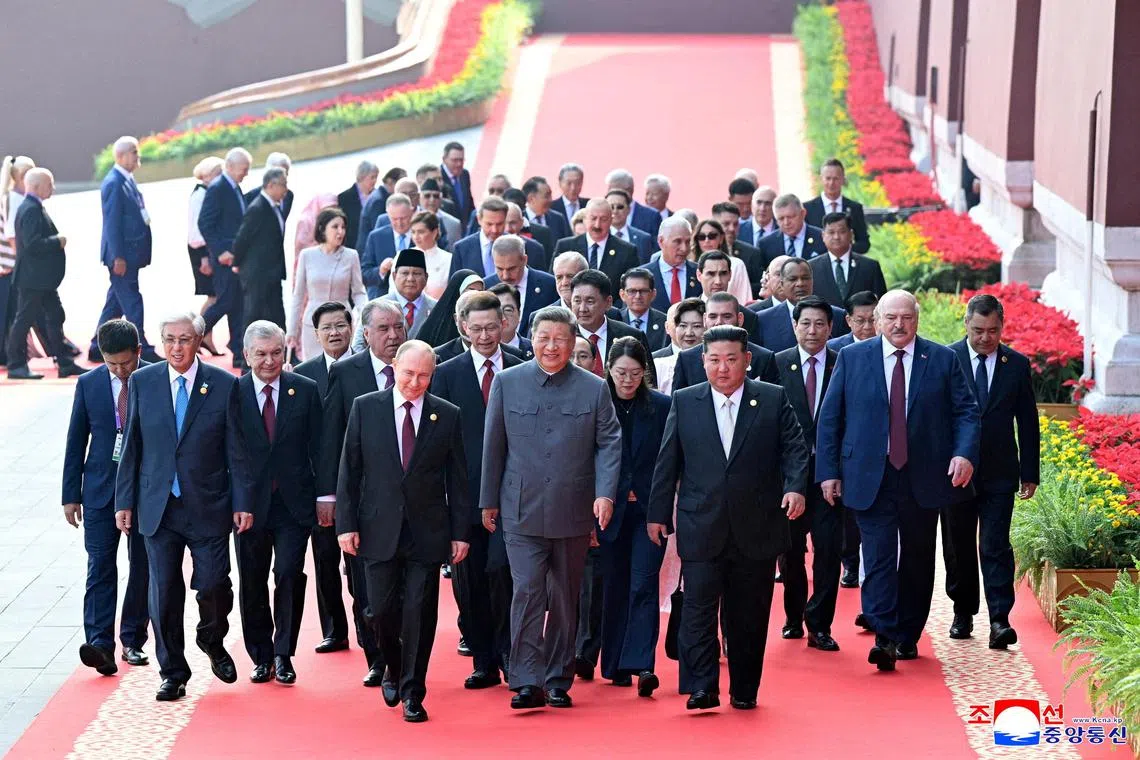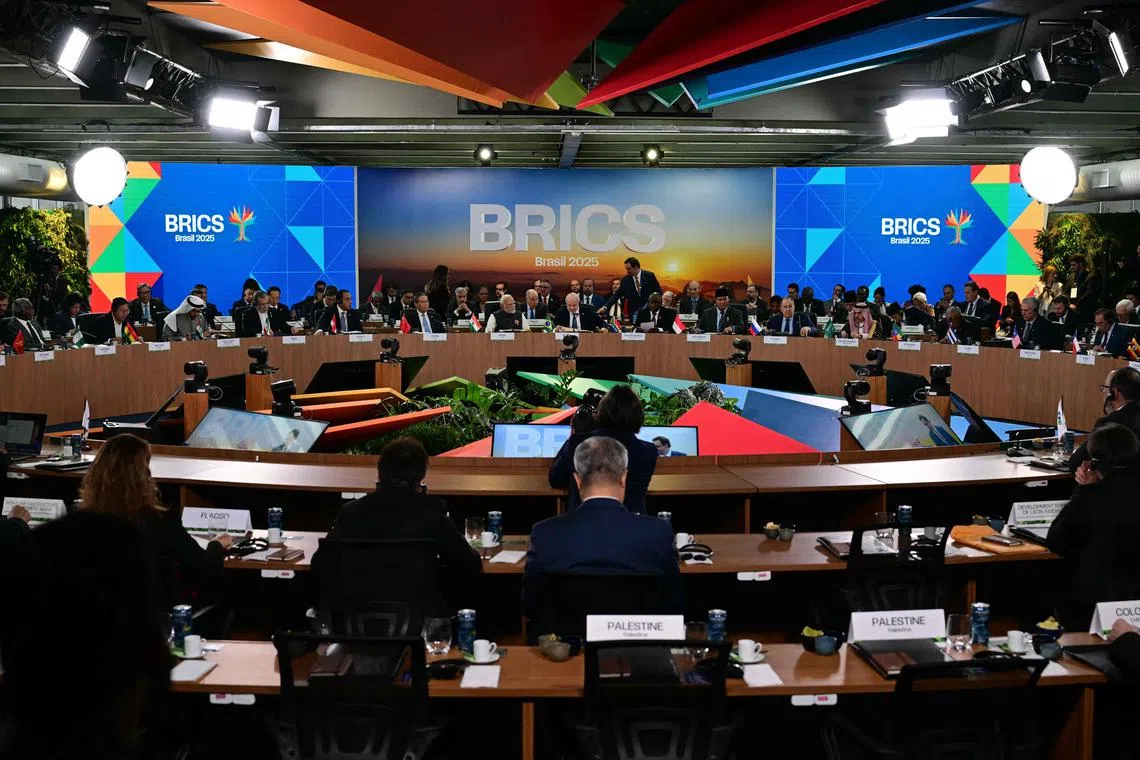China doubles down on Brics to defend free trade but grouping’s divisions remain
Sign up now: Get insights on Asia's fast-moving developments

Chinese President Xi Jinping, flanked by Russian President Vladimir Putin and North Korean leader Kim Jong Un, leading world leaders in Beijing on Sept 3.
PHOTO: REUTERS
Follow topic:
- Chinese President Xi Jinping asserts economic globalisation is inevitable, criticising US tariffs for isolating nations and causing global economic uncertainty.
- Brazil's President Lula condemns "tariff blackmail", adding that Brics countries have been victims of “unjustified and illegal trade practices”.
- Experts note Brics' diverse interests and members' continued ties with the US, limiting potential beyond symbolic unity.
AI generated
BEIJING – Chinese President Xi Jinping on Sept 8 doubled down on efforts to pitch China as a defender of the international order and free trade at a meeting of Brics, but divisions remain among the 11-member grouping.
“Economic globalisation is an unstoppable historical trend,” Mr Xi said at the online meeting convened by Brazilian President Luiz Inacio Lula da Silva.
“The development of all countries cannot be separated from an open and cooperative international environment, and no one can retreat into an island of self-isolation,” he added in an implicit criticism of the US’ tariffs regime that has caused global economic uncertainty.
US President Donald Trump’s freewheeling use of tariffs appears to have given fresh reason for unity among the members of Brics, a disparate grouping that accounts for nearly 40 per cent of global gross domestic product. India and Brazil face some of the highest tariffs rates by the US, at 50 per cent.
Brics consists of 11 economies, up from the original five of Brazil, China, India, Russia and South Africa. The non-Western grouping dominated by China and Russia hopes to raise the international influence of Global South countries.
Mr Xi’s pitch comes after a series of meetings in China with leaders such as Russia’s Vladimir Putin and North Korea’s Kim Jong Un, during a Sept 1 summit of the Shanghai Cooperation Organisation (SCO) held in Tianjin and a Sept 3 Victory Day parade to mark 80 years since China ended its War of Resistance against Japan in 1945. Mr Putin also took part in the virtual Brics meeting.
Associate Professor Dylan Loh of NTU believes there is a lot of continuity in Mr Xi’s speech at the Brics meeting from his statements at the SCO summit and the Victory Day parade.
“The twin themes that I see emerging quite strongly is his emphasis on the Global South (and China’s position as a leader here) and China’s role as the key upholder and defender of the current international order,” said Prof Loh, who studies Chinese foreign policy.
“It has a lot to do with his GGI (Global Governance Initiative), and he mentioned it in his Brics online speech as well, because he presents the GGI as the solution to the current international malaise.”

Brics consists of 11 economies, up from the original five of Brazil, China, India, Russia and South Africa.
PHOTO: AFP
Mr Xi proposed the GGI at the SCO summit in Tianjin on Sept 1. This framework positions China as a key contributor to global development and peace.
Yet Brics leaders had to walk a tightrope between criticising the anti-trade moves of the US while avoiding a confrontation with Mr Trump. Like Mr Xi, Mr Lula did not mention the US or Mr Trump by name.
In July, Mr Trump threatened an additional 10 per cent tariffs on countries that align themselves with the “anti-American policies of Brics”, right after the conclusion of the annual Brics summit in Rio de Janeiro.
On Sept 8, Mr Lula said “tariff blackmail” has been “normalised as a tool for conquering markets and interfering in domestic issues”, adding that Brics countries have been victims of “unjustified and illegal trade practices”.
Perhaps as a sign of his less-than-full-throated endorsement of Brics, Indian Prime Minister Narendra Modi did not attend the video call and was represented by Foreign Minister S. Jaishankar.
While Mr Jaishankar highlighted issues such as reforming multilateralism and addressing “major shortfalls” of international organisations, he also said some of India’s biggest trade deficits are with Brics partners.
India’s biggest trade deficit is with China, from where it has imported electronic goods, machinery and chemicals despite, until recently, frosty political ties.
Dr Andrea Ghiselli, a lecturer in international politics at the University of Exeter who focuses on Chinese foreign policy, said American actions have provided significant impetus for Brics and SCO members to draw closer.
The SCO was founded as a security-focused group made up of China and Russia as well as four Central Asian states – Kazakhstan, Kyrgyzstan, Tajikistan and Uzbekistan. It now has 10 members, including India, Pakistan, Iran and Belarus.
Dr Ghiselli said that while Brazil’s and India’s relations with China remain complicated, SCO and Brics nonetheless offer them platforms to demonstrate that the US is not their only partner of consequence.
They can also position themselves as leading actors in advancing a world order less centred on the West.
That said, Brics and SCO countries remain a highly heterogeneous group with divergent interests and varying relationships with China, said Dr Ghiselli, who also heads research at the ChinaMed Project of the Torino World Affairs Institute, an Italian think-tank.
He said: “It is therefore quite possible that little will emerge beyond symbolic photo opportunities. Many Brics members, like several within the SCO, continue to value good relations with the United States despite current tensions, and are likely sceptical of what China is either willing or able to offer.”


